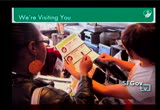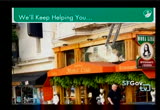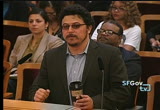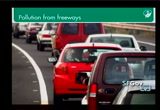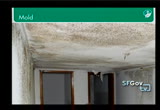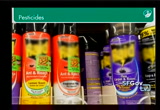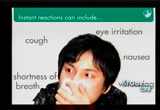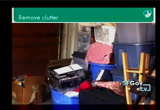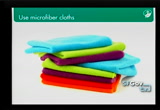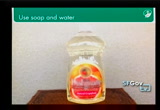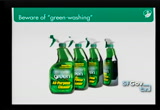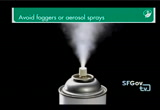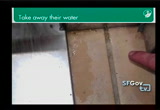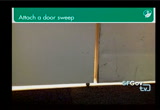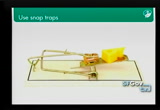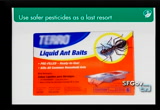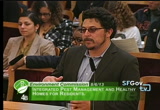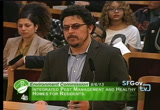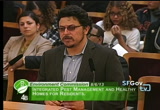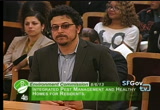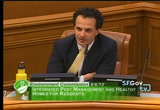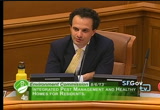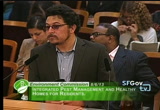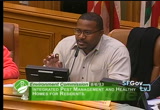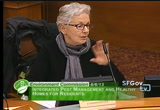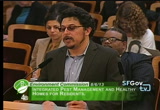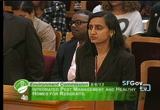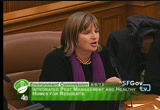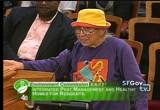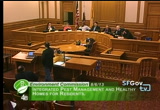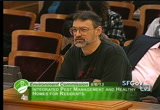tv [untitled] August 21, 2013 1:00pm-1:31pm PDT
1:00 pm
we've also visited over 2000 businesses, restaurants in the city explaining to them what it means to them how they can be in compliance, answering any questions they may have. we're also giving out [speaker not understood] to inform the customers in multiple languages. we also gave out placards to display to explain the ordinance briefly. we also tabled a restaurant depot, we'll continue to do so until october 1st. we held a bag fair last month connecting bag vendors with restaurant owners in the city so they can be in compliance. we're helping you stay in compliance by being out in the community, visiting you, calling you, mailing you, answering any questions you may have because we're counting on as as our anchor businesses in san francisco to help make this ordinance more effective. thank you.
1:01 pm
(applause) >> all right. so, that's the outreach we're doing for the check out bag ordinance. we'll continue door to door through the fall to help businesses get up to speed on the nuances. as clark mentioned there's a lot of nuances exempt. what types of bags you can and can't charge for. we want to make sure all restaurants are aware and also the right collateral material to help educate city residents and consumers. up next we're going to have a presentation, again focused on residents. and again, sit back as the [speaker not understood] and learn about fantastic ways to clean your home in a healthy way. doing that presentation is our senior coordinator [speaker not understood].
1:02 pm
>> hi, i'm [speaker not understood] and i'm with the department of the environment's environmental justice program and i'm here today to tell you some simple actions you can take to make your home healthier. we all deserve to have healthy homes. we all deserve to have healthy families. however, as we know in san francisco, some people are not as healthy as others. for example, bayview hunters point has significantly higher rates of asthma and other illnesses than other parts of the city. there are many reasons for these higher rates of illness. some are within our control, but many are not. for example, two freeways cross the neighborhood which creates air pollution and we know air pollution is bad for our health. for many years two nearby power plants caused much pollution in the southeastern part of the city, but both were shut down thanks to a lot of effort from the community.
1:03 pm
however, industry and the neighborhood still creates air pollution. sometimes the air indoors is more polluted than outdoors. since we spend the majority of our time indoors, today we're going to talk about indoor pollution and specific things we can do to make our homes healthier. while we can't control the location of the freeways, we can control what we do in our own homes. so, let's talk about indoor air pollution and identify a few things that can make our homes unhealthy. first, there's dust and dust mites. they're a common trigger for allergies. then there's mold which can grow inside our homes and pollute our air. mold is a fungus that grows in dark and moist environments. some molds can be very dangerous and can cause serious health problems if they're not
1:04 pm
dealt with immediately. especially for people with asthma. then there are pests like cockroaches, ants, and rodents. pests are not only a nuisance, but they're asthma triggerses. roach and rodent droppings and body parts of dead pests can be part of the dust we breathe and are not healthy for us. many of the products we use are also harmful to us. for example, aerosol sprays can trigger asthma. whether it's hair spray or oven spray, aerosol sprays create a fine mist of chemicals that pollute our indoor air and goes straight into our lungs when we breathe them in. it's the same thing with pesticide sprays or pesticide foggers or bug bombs, and air fresheners. they contain toxic or harmful chemicals that irritate the lungses and can trigger asthma or allergic reactions. how many of you use bleach or
1:05 pm
ammonia when you clean your home? well, unfortunately bleach and ammonia contain chemicals that can trigger asthma or even cause asthma in people who don't already have it. these products are not receiptv i and can be avoided. and whatever you do, don't ever combine the two as it can create a poisonous gas. ~ healthy [speaker not understood]. whether it's bleach or mold, you could experience a cough. your eyes could water or feel like they're burning. you could suddenly find that it's hard to breathe. you might make wheezing sounds. and you could feel nauseous. and while you may not feel all of these symptoms at once, experiencing just one of them shows you why it's so important to improve your indoor air quality to improve your health and protect your health.
1:06 pm
and the health of your family. the good news is that i'm going to talk about simple actions you can start doing today that can make a big difference in improving your home's indoor air quality. first, keep it dry. as i mentioned earlier, mold grows in moist places so make sure your carpets, window sills and walls are as dry as possible by letting them air out or wiping them down when they're wet. open the windows. while this can help dry out a bathroom, it also brings fresh air into the home. while it's true there is air pollution outside, the air is often of better quality than inside our homes. so, make sure your window is open to allow for plenty of fresh air to circulate. remove piles of clutter. pests like mice and cockroaches love nesting in clutter including paper and boxes.
1:07 pm
keep your counters clean. sweep and wipe up any grease or crumbs so they don't attract pests. avoid using cleaners that contain harmful chemicals. for example, products with ammonia and bleach or strong fragrances. though some people think the smell of bleach means their home is clean, no smell is actually better because strong scents can trigger asthma or other reactions. there are safer products and methods out there. for example, here's a lemon. did you know that a lemon not only leaves your home smelling fresh, but also cuts grease? use micro fiber cloths when dusting or wiping counters. these cloths are reusable and are dust and dirt magnets whether you use them dry or wet. they'll help you get those dust mites out. they also cut down the need for chemicals. for example, you could just use
1:08 pm
a micro fiber cloth and water to clean your mirrors and windows rather than using window cleaner. next, become familiar with simple household products that can do an excellent job cleaning. for example, baking soda can clean sinks and counters. a scrub brush and some elbow grease go great with the baking soda. did you know that dish soap can be used for more than just cleaning your dishes? plain old soap and water is often the safest and best cleaning solution. buy unscented dish soap if possible and definitely not the kind that says antibacterial. a solution of hot water and dish hope can be used for all sorts of cleaning, even tough jobs like removing mold on hard surfaces. scrub and mold off the solution and rinse clean afterwards, then dry it completely. of course, if you have a very serious mold problem, you must contact your landlord immediately so he or she can
1:09 pm
take the necessary steps to fix the problem ~. a solution of dish soap and water in a spray bottle can even kill live ants or cockroaches on contact. soap and water is also our best friend for killing germs like these. many of us have become obsessed with disinfecting. but remember, when you remove the dirt, you remove the germs that stick to the dirt. so, in most cases you don't really need bleach or other disinfectants in your home. if you really feel the need to use a disinfectant, try to choose one with hydrogen peroxide, is trick acid or lack tick acid rather than bleach or other chemicals. ~ and beware of green washing. that's when companies use words like green or natural on their products to make it seem like their products are safe or environmentally friendly. sometimes they're not. how can we tell? it's not easy.
1:10 pm
if you're near a computer, your best bet is to look up the product on good guide.com, or for real adventure, try reading the ingredients. if you see the word fragrance or there are a lot of health warnings, then chances are it contains chemicals that are not healthy for you. now that we have learned what to do to clean our homes, let's learn how we can prevent and control pests. first, do not use aerosol sprays or indoor foggers. they will spray a fine mist of toxic pesticides into the air and throughout your home. these pesticides get into your lungs and can settle on your furniture and belongings. this is not healthy for you, your family, or your pets. and even though they may seem to kill your bugs, they're not really very effective at solving pest problems. they only kill the pests you can see, not the ones that are hidden.
1:11 pm
don't use rat or mouse bates. they're dangerous for kids, pets, and wildlife, too. there is another kind of pesticide you shouldn't use, and that's the illegal kind. you might have seen this product for sale, but you should know that it can be harmful to your health. besides that, it just doesn't really work well. so, how do we control pests without using these poisonous chemicals? the most important step is prevention. and there are four ways to prevent pests. take away their water. take away their food. take away their homes. and don't let them in in the first place. all pests need water so make sure your house is dry. check for condensation behind appliances like refrigerators and fix any leaks. all pests need food, and if there's any in your house that they can get to, they will. don't let the crumbs on your floor or in your pantry be their next meal. store food in sealed
1:12 pm
containers. this includes dry foods like cereal and crackers. once you've opened something, seale it tightly before you put it away on the counter, shelves, or in the pantry. make sure the trash recycling and compost are taken out regularly out of your home. pests can quickly find food inside trash bags that are left open in the home. and even though it's unpleasant, clean your bins as often as possible and take your compost out every day. it only takes a couple days for flies to hatch in the bins. don't let pests enter your home. look around for possible entries like this and block them off. in this case, an outlet cover would help. are pests able to walk through your front door to get into your home? attach a door sweep. which is a metal or vinyl strip that eliminates gaps when you attach it to the door. this will help prevent pests
1:13 pm
from crawling under the exposed gaps. remember, a mouse only needs the space that is the width of a pencil to get into your home. seal all cracks with sealant. even the smallest openings can serve as doorways for ants and roaches. here we can see some space around this pipe. though it looks small to us, it's big enough for a mouse to crawl through to enter your home in addition to smaller pests like ants and roaches. close up these types of gaps with a steel ring that fits around the pipe. that's called a sketching plate. thou that you've done your best to prevent pests from entering your home, what do you do if they're already inside? one tried and true method of catching mice is the mousetrap. set these up carefully against walls where mice like to drawv and keep them away from children and pets. ~ crawl if you have a fly problem, don't forget the old-fashioned fly swatter.
1:14 pm
it's inexpensive, lasts a long time, and doesn't need chemicals. fly tape is another option. it's sticky and flies can't escape. just remember that these tools won't solve your pest problem if you haven't cleaned up their food source yet. and if all these methods aren't working, use safer pesticides as a last resort. although you shouldn't use rat and mouse baits, you should use ant and roach baits as they are a safer more effective way to kill ants and roaches. ants are a streaked to the bait and take the poison back to the colony. same is true with roach bait. they survive long enough to pass it on to other roaches. also after roaches die from the bait, live roaches feed on the dead ones and get poisoned as well. [laughter] >> now that you've taken the bait and learned simple actions you can take to help reduce
1:15 pm
indoor air pollution while keeping your home healthy and clean, we need your help. we need you to talk about what you've learned to other people in your neighborhood, to your family, friends, and neighbors. most people don't realize that everyday chemical products like air freshener and bleach and certain pesticides can make them sick and they can easily avoid them. you now have the information they need to make healthier choices. because we all deserve healthy homes and we all deserve healthy families. thank you. (applause) >> once again, commissioners, thank you for the opportunity to share. if you have any questions about the campaigns, about what you just witnessed, just ask. otherwise we'll do it over. >> thank you so much, donnie and the team.
1:16 pm
clark, that was amazing. great work. and i see we have a comment request from commissioner josefowitz. >> i thought that was fascinating. i learned some stuff. i now feel guilty about doing the wrong thing. i had a few questions about the plastic bag about just sort of does it apply to both? are there also follow-up materials that are kind of summary -- >> absolutely. the first level outreach we did, we sent the mailings to all the restaurants in the city that had a letter outlining the ordinance. we offered ethics spec sheets that answered questions, the placard you saw. we started robust the door to door campaign, the material window stickers, we showed posters and more placards. we started [speaker not understood], asking door to door, ask any questions. we've been continuing to offer the materials. furthermore, our website has a resource page for restaurants
1:17 pm
and retail establishments to go download more copies of this material in most of the languages. >> do you think you'll reach all -- what proportion of the restaurants i guess do you think you'll reach? >> i'd say all of them. we plan to reach all of them. >> fantastic. and, so, just so i understand, the last question for the plastic bag thing, you sort of show up and then you have a bunch of printouts of the presentation or how does the actual -- >> it really varies. clark just gave you a snapshot of the conversations we have on the door to door basis. there are conversations at merchants associations we'll go to to answer the questions. be a more formal presentation like you just saw. often we're responding to the concerns and the creative situations that restaurants in san francisco bring to us to solve and the team to
1:18 pm
understand and articulate the ordinance in a way the restaurants can move forward with their business. because, again, there's a lot of exceptions to what can be charged and when you can use the charge. i want to make sure that's very clear so customers aren't confused as well. >> do the same people who do the outreach also do the compliance? or how does that work? >> you know -- >> if someone actually thinks they're doing a take-out bag, but actually they're doing like wrap the soup bag. >> we're still interested in the education piece. we haven't even begun to have the conversation about enforcing the ordinance. we're not in compliance mode yet. it's very much outreach and education and trying to solve, and be basically a customer service sept it right now. >> it would be great if one could have different folks doing the outreach than the compliance. >> i agree. >> i think that might be -- >> it would be fun to walk in, friendly, walk back in 15 minutes later.
1:19 pm
[multiple voices] >> it could be interesting, but i don't think we'll go that route. >> have you thought about -- i mean, that's one of the things we've spoken a bit about on the commission, the sort of marine -- the negative impacts on the marine environment and on our beaches of plastic bags and plastics in general. there was an assembly bill that we supported that had a similar -- it didn't just focus on plastic bags, but focused generally trying to divert plastics away from the marine environment. and i thought it would be a great opportunity when you're giving these presentations. maybe if you think it's appropriate to maybe include a slide about that because that's i think one of the commission's top priorities when it comes to some preventing pollution. >> absolutely. when we are engaging our residents about plastic bags and impacts on them, we have
1:20 pm
the messaging to discuss impact plastics have. just litter in general. it wouldn't be a problem for us to add that communication to the business. as you can see with the business communications it's really -- for them it's the logistics. when do i charge, when do i not. we want to make sure we're giving the nuts and bolts and we can get into the why. certainly with the residents we try to expand the reasoning, do a pledge, get people to pledge to use reusable bags, to move away from plastics. all those different reasons when we do that. >> i don't want to take up the whole time. maybe a few more questions on the next presentation. >> sure. >> i'll be very brief. i was wondering how you chose the sort of categories of chemicals that you were going to do the outreach on because there's also chemicals involved in washing clothes or in doing hair, household plants, pets, things like that which can be tremendously toxic.
1:21 pm
>> absolutely. as you saw it was a fairly robust presentation as it is. >> it's phenomenal. >> we wanted to make sure we hone in on a particular type of material to start and we can move on. ideally as you saw, we're really just focusing on easy victories in the home, things that are going to be cheap and effective for everybody to access and then, yes, moving on to other sources of toxicity given the next step obviously. if we can get this message out to the public and then move on. >> that's what i really wanted to know is all the things i'm doing wrong taking care of my house plants personally. [multiple voices] >> the next meeting, yes. >> thank you very much. >> thank you. commissioner king. >> so, when this was set up, this was originally done for the watching audience. all of you wonderful people that could be watching and can't get down to city hall because life prevents you from coming down here after you've
1:22 pm
worked a full day. and, so, with that being said, i'm asking for this presentation as robust and wonderful as it is, i am asking for some discipline from the people up here and the people in the audience to know that this was a presentation that is part of the road show of our outreach team and our department environment. you were here today to witness the debut of sfe live. [laughter] >> in your homes. and, so, i would ask everybody that if you're watching this and you've got questions, do one or two thing. one, if you're the watching audience, you should call 355-3700. did i say that correctly? >> um-hm. >> 415-355-3700. >> send us a twitter, a blast,
1:23 pm
sf environment and reach us there. >> right. let us know that you watched. if you are here tonight, whether you are a commissioner or in the audience, i would then suggest -- and you saw something that you really liked and you want to talk about in the future, we can make it a future agenda item and focus in directly on that. other than that, i would plead with you -- because some of you are here for other things that are on the agenda that we have some discipline, that we watched a fantastic presentation and that we can move on to the rest of this great agenda. >> thank you, commissioner king. commissioner wald. >> i'll talk fast. i want to say like others, these were fabulous presentations. the fact y'all are out there in the community giving these to people, to our neighbors and the businesses that we deal with, is really fantastic. >> thank you.
1:24 pm
>> about the plastic bags, the work that you're doing puts all the burden on the restaurant owners. i wondered if you have given any thought to educating san franciscans about what they ought to expect when they go to restaurants after october. >> absolutely. we have a parallel communications plan for residents of san francisco. so, last fall when the first phase of the ordinance went into play, we had a blitz of over, i think it was over 60 corner transit hub outreach events where we have teams giving out reasonable bags from our canvas bags. they were doing pledges, making folks take photos with pledges, i pledge to use reusable bags. an exciting fall campaign, talked to residents. we look to do it october 1st when the ordinance goes into effect. you're right, part of this ordinance isn't just the plastic bags, but it's also getting residents of san
1:25 pm
francisco to bring their own bags. that is a big element of our campaign. today our department has in its history given over 100,000 canvas bags. so, we've really continued to promote the reasonable bag element and we will continue to do so. that will be a strong push in the fall. >> that's wonderful. and then the question i had about sraddha's wonderful presentation, could you sort of give me a sense of the venues at which she would make that presentation? is that what you do when you actually go into an individual house? or is that more typical of like a group -- a homeowners meeting or something, a tenants meeting? >> this particular presentation is a new presentation, but it will be geared towards public housing residents in san francisco. we have made similar presentations at housing
1:26 pm
authority type meetings for tenants. and also for the hope s.f. leadership academy. so, it tends to be a group of public housing residents who gather in a room where we give the presentation. >> great, thank you. thank you both for those. >> commissioner, thank you. donnie has put in a lot of work on this. and before we go to public comment, maybe a quick thought from our director. >> i also just wanted to chime in and thank donnie who has done a fantastic job leading up our outreach team, our guest, donnie, and clark and sraddha for the fantastic presentations. as you saw, the message is clear, it's practical, it's actionable and that's what we want to get out into the community how they can participate. but also i think it was underscored in public comment, we really stress on being culturally competent and putting as many of our materials into -- as the new languages as possible so we can reach the broadest constituency. just wanted to thank you all for the great presentations and more to come at the future
1:27 pm
commission meetings. >> thank you. any em members of the public like to comment on this item? yes. ~ lou harris. i have a question, i'd like to have it answered now. i live next door to an open space. this is about mouse and rats have decided my house is a good place to go and live. if i don't want to poison them or kill them, if i trap them live, what do i do with them? where do they go? where they won't be bugging other people? is there a place for them? i don't believe in killing wildlife just because they're being wildlife. >> we're working on mice, s-r-os, i believe. i might have that wrong. >> wait a minute, point of
1:28 pm
order here. you know, i think you should appoint somebody to speak with her, but there is actually no comment, public comment. >> yes. what? >> maybe we can give your answer within 30 seconds unless you have more remarks. >> i can give a 30-second answer. okay. >> unfortunately, we're not allowed to release any life rodents anywhere except where you caught them. it's state law. so, you are limited in what you can do. you have to either kill them with a trap or bait, which we don't recommend, or keep them out. >> they're eating my clothes. [laughter] >> thank you. thank you very much. any other members of the public? good evening, commissioners. eric burks, san francisco green party and local grassroots organization in our city.
1:29 pm
those two presentations were excellent. i think those are probably -- i've been watching government tv and going to hearings for 10 years and i think those were the best presentations i've ever seen. i guess because they're geared to the public. i would say -- i would agree with -- i can't remember which commissioner brought it up, but i think it was commissioner josefowitz that maybe a handout or something like that that's really comprehensive on all household chemicals. not just pesticides, because i know that it greatly improved my life decades ago when i got every single chemical out of my house and went natural on everything. so, it would be good with that presentation to have some kind of flyer to hand out. and maybe with the other presentation as well. any presentation, have a flyer that goes with it that kind of
1:30 pm
broadens what the presentation said. i think though presentations were excellent. as commissioner king said, this is a good way to inaugurate the department of the environment on tv. >> thank you. any other speakers? seeing -- oh, one more. hi, my name is eddie. i want to say i appreciate the presentation. one thing that came to my mind when i was looking at the presentation was that a lot of young people that -- who are immigrants to this country, they may not appreciate the knowledge that they need to learn about how to deal with pests and how to use -- not use chemicals, especially for many of the young people. i think they should be the next generation of people that we need to really help to learn those knowledge.
38 Views
IN COLLECTIONS
SFGTV: San Francisco Government Television Television Archive
Television Archive  Television Archive News Search Service
Television Archive News Search Service 
Uploaded by TV Archive on

 Live Music Archive
Live Music Archive Librivox Free Audio
Librivox Free Audio Metropolitan Museum
Metropolitan Museum Cleveland Museum of Art
Cleveland Museum of Art Internet Arcade
Internet Arcade Console Living Room
Console Living Room Books to Borrow
Books to Borrow Open Library
Open Library TV News
TV News Understanding 9/11
Understanding 9/11